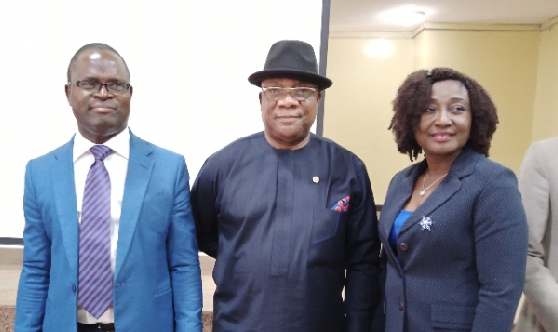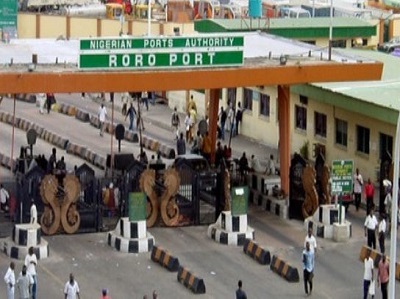CRFFN: ICRC Pads POF Projection By Over 200%

· Cargo throughput statistics contradict POF annual N5billion goal
· Maritime Editors probe 20% reservation for SW Global
By Kenneth Jukpor
The Registrar of CRFFN, Barr. Samuel Nwakohu revealed this N5million mark during a press briefing last week, even as he noted that the figures could exceed the fiscal projection which was done by the Infrastructure Concession Regulatory Commission (ICRC).
While the business case prepared by ICRC on behalf of the Council for the Regulation of Freight Forwarding in Nigeria (CRFFN) projects N5billion annual income, 2018 cargo throughput of 73,175,127MT would account for about N256million using the N3.5k on general cargoes.
However, the average container throughput for the last five years is 1,656,000TEUs with the POF calculation amounting to N1.6billion, according to statistics from CEIC, a leading global provider of macroeconomic and sector data.
With the expectation that the land borders would be reopened in the first quarter of 2020, the N5billion projection looks opaque, except if there are also projections to increase the charges for POF significantly during the year.
On expected revenue from the POF, the CRFFN Registrar said: “The full business case that the ICRC prepared projected N5billion annually, but with the technology that we have on ground, we know we can surpass that amount.”
Since shipping accounts for more than 90% of cargo traffic in Nigeria, it is difficult to figure out how CRFFN intends to generate the N5billion, let alone surpass that amount.
Speaking with MMS Plus on the conflicting figures, the Head, Education and Research, CRFFN, Dr. Alban Igwe asserted that the finance experts who developed the business case must have clearly analyzed their findings which were also endorsed by the National Assembly.
“Those who specialize in preparing a business case have done their work and submitted the report which was also adopted by the Senate. The calculations included airfreight, land border cargoes as well as container traffic and crude products. It also factored in the expected increase in trade volumes at the ports” Igwe said.
Meanwhile, the sharing formula of the revenue from POF has also posed a degree of uncertainty and discomfort to industry stakeholders who lampoon the arrangement that sees a private company, SW Global Limited in-charge of the revenue collection keep 20 percent of the entire sum.
SW Global Limited, an Application Service Provider (ASP) and CRFFN’s technical partner would be netting N1billion annually, from the projected N5billion POF annual revenue.
The Registrar of CRFFN revealed the sharing formula of POF to be; 25 percent going into the Federation account towards nation-building, while the claimants, that is, the associations are encouraged to keep 35 percent. The remaining 40 per cent will be shared between the SW Global and the CRFFN with each getting 20 percent.
Responding to questions from journalists on the services provided by SW Global to validate its 20 percent collection, Nwakohu noted that the private company wasn’t just involved in revenue collection but also engaged in training as well as other services, asserting that the percentage was a fair bargain for the private company.
Nevertheless, the President of League of Maritime Editors and Publishers, Mr. Kingsley Anaroke expressed dissatisfaction with the arrangement, stating that the high figures allotted to the private company was suspicious and could make room for embezzlement even as modalities for collection and sharing, especially to the claimant are not transparently delineated.
The group asked, “At what point does the claimant get his 35 percent and how? Is the money paid directly to the Treasury Single Account(TSA) or SW Global’s account?These grey areas need to be overtly stated, even as we foresee this as another tool of control of the freight forwarders by the government.”
The League of Editors and Publishers also queried the credibility of the company, SW Global Limited, especially against the background that it was not selected through a public procurement process.
“What are the training modules SW Global would provide? Don’t forget that this SW Global took the governing board members to Dubai on jamboree. Has any of them added value to the system with the Dubai knowledge? This is one of the companies used by some Senators to execute controversial contracts in CRFFN. SW Global is owned by former legislators,” Anaroke asserted.
Meanwhile, a veteran freight forwarder who pleaded anonymity told our correspondent that the monies to be collected by SW Global would be used to grease the palms of the governing board members of CRFFN and other highly placed officials in the legislature.
“The 20 percent should have been given directly to CRFFN so that SW Global would be paid for its services. It would have been better to allow this fund go to the government as Internally Generated Revenue (IGR). That company wouldn’t provide any training, besides, isn’t that the responsibility of CRFFN?” he queried.
SW Global Limited is an Application Service Provider (ASP). Its model provides institutions with quick and easy access to mission-critical applications, and removes the need for these institutions to bear directly the total cost of ownership of business applications and/or the need to engage in expensive ICT infrastructure acquisition.







